
The West Coast Eagles are a professional Australian rules football club based in Perth, Western Australia. The club was founded in 1986 and first competed in 1987 as one of two expansion teams in the Australian Football League (AFL), then known as the Victorian Football League. The club plays its home games at Optus Stadium and has its headquarters at Lathlain Park. The West Australian Football Commission wholly owns the West Coast Eagles and the Fremantle Football Club, the AFL's other Western Australian team.
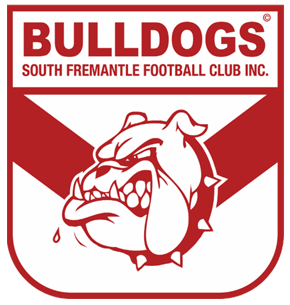
South Fremantle Football Club is an Australian rules football club based in Fremantle, Western Australia. The club plays in the Western Australian Football League (WAFL) and the WAFL Women's (WAFLW), commonly going by the nickname the Bulldogs. Since its founding, the club has won 14 WAFL premierships, the most recent of them in 2020.

Christopher Dylan Judd is a former professional Australian rules footballer and captain of both the West Coast Eagles and Carlton Football Club in the Australian Football League (AFL). He is regarded as one of the greatest players of all time.
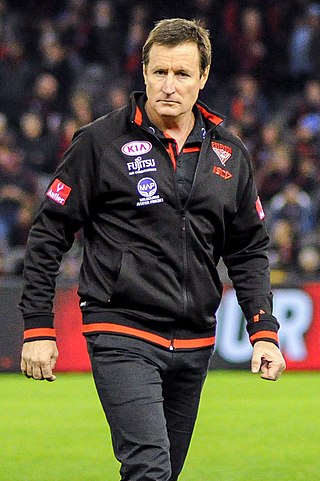
John Richard Worsfold is a former Australian rules football coach and player. He had a long association with the West Coast Eagles as player (1987–1998) and coach (2002–2013), captaining the club to premierships in 1992 and 1994 and coaching the club to a premiership in 2006. He was also the senior coach of the Essendon Football Club in the Australian Football League (AFL) between October 2015 and September 2020.
Dean Phillip Kemp is a former Australian rules footballer who played for the West Coast Eagles in the Australian Football League.
Phillip Matera is a former Australian rules footballer.
The John Worsfold Medal is an Australian rules football award presented annually to the player(s) adjudged the best and fairest at the West Coast Eagles throughout the Victorian Football League/Australian Football League (VFL/AFL) season.

Christopher Douglas Mainwaring was an Australian rules footballer who played for the West Coast Eagles in the Australian Football League (AFL) and for the East Fremantle Football Club in the West Australian Football League (WAFL).
Stephen Malaxos is a former Australian rules footballer and coach from Western Australia. While playing for Claremont in the West Australian Football League (WAFL), he won the 1984 Sandover Medal. Malaxos was an All-Australian with Claremont in 1986 and while he was with the West Coast Eagles in 1988. He was the inaugural fairest and best player at West Coast (1987), holds the Eagles' record for the most possessions in a game (48) and captained the club in 1990.
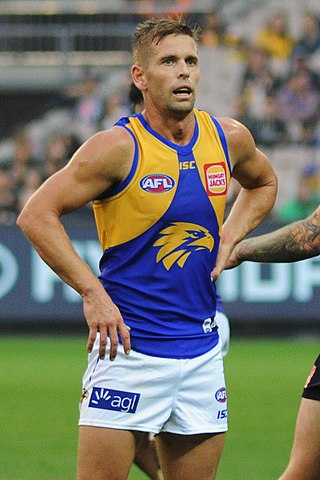
Mark LeCras is a former Australian rules footballer who played for the West Coast Eagles in the Australian Football League (AFL). He was predominantly used as a small forward, though he has occasionally played in the midfield. He won an AFL Premiership with West Coast in 2018, his last season. LeCras is the last West Coast Eagle born before the club's first game to play for them.
Matthew Harley Priddis is a former professional Australian rules footballer who played for the West Coast Eagles in the Australian Football League (AFL).
Christopher Lockley Lewis is a former Australian rules footballer who played over 200 AFL senior games for the West Coast Eagles.

Adam Simpson is a former Australian rules footballer and coach. A left-footed midfielder, his playing career for North Melbourne spanned from 1995 to 2009, where he played 306 games. He coached West Coast from 2014 until parting ways during the 2024 season, having led them to the 2018 premiership.
Peter Lori Sumich is a former Australian rules footballer who represented West Coast in the Australian Football League (AFL) and South Fremantle in the West Australian Football League (WAFL) during the 1980s and 1990s.
Robert John Wiley is a former Australian rules footballer who played for the Perth Football Club in the West Australian Football League (WAFL) and for the Richmond Football Club and West Coast Eagles in the Victorian Football League (VFL).
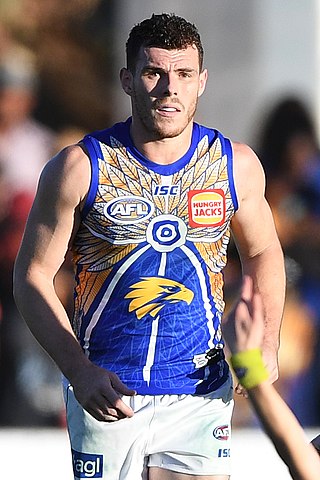
Luke Shuey is a former Australian rules footballer and former captain of the West Coast Eagles in the Australian Football League (AFL). He retired at the conclusion of the 2023 AFL season.
Peter Michael Worsfold is a former Australian rules footballer who played for the Brisbane Bears in the Australian Football League (AFL) during the early 1990s.

Andrew Gaff is a former professional Australian rules footballer who played for the West Coast Eagles in the Australian Football League (AFL). He played predominantly as a midfielder.
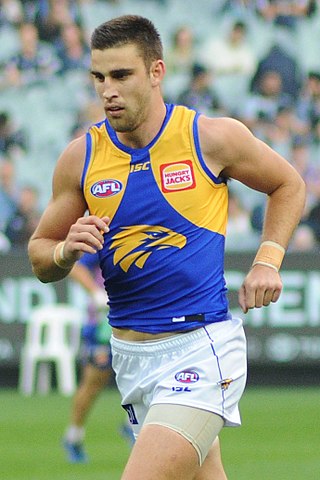
Elliot Yeo is a professional Australian rules footballer playing for the West Coast Eagles in the Australian Football League (AFL). He previously played for the Brisbane Lions between 2012 and 2013. Yeo won a premiership with West Coast in 2018, and is a dual All-Australian, dual John Worsfold Medallist and dual Glendinning–Allan Medallist.
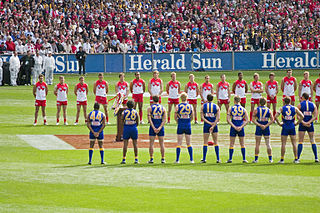
The West Coast Eagles is an Australian rules football club based in Perth, Western Australia, currently playing in the Australian Football League (AFL). The club was formed in 1986, and played its first season in the competition in 1987. Having lost the 1991 grand final to Hawthorn, the club won premierships in 1992 and 1994, becoming one of the most successful teams of the 1990s. West Coast won its third premiership in 2006, but declined afterwards, finishing last in 2010, before undergoing a rapid resurgence the following season to finish fourth in 2011.










